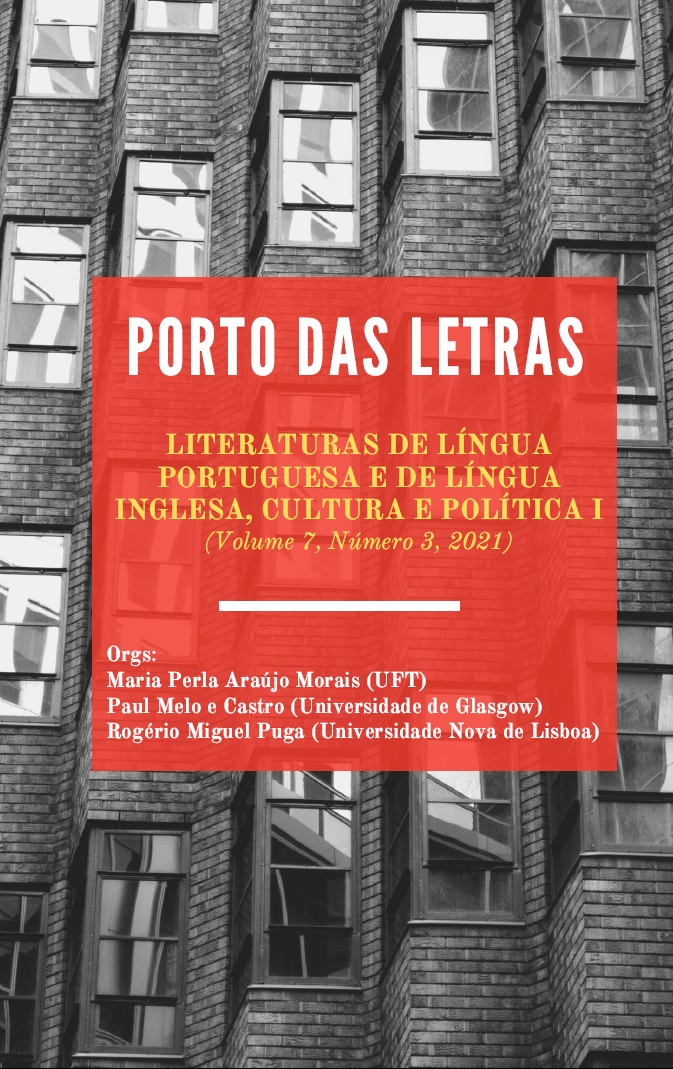A Literatura como Pensamento Crítico: Experiências Estético-Cognitivas em torno de Pandemias Ficcionais
Resumo
O presente artigo de síntese pretende reflectir sobre a forma como textos literários, políticos e religiosos têm, ao longo dos século, representado, ou ficcionado de modo, quer realista, quer fantasioso, pandemias alegóricas e as suas causas e consequências. O desafio para falar sobre pensamento crítico, literatura e política nas literaturas portuguesa e inglesa levou-nos, em plena quarentena, a decidir reeditar, nesta revista brasileira, um texto sobre pandemias literárias, partindo de um artigo mais curto que publicamos originalmente na imprensa portuguesa (Puga 2020).
https://www.iscap.pt/cei/publicacoes/culturas-partilhadas-patrimonio-partilhado-responsabilidade-partilhada.
Referências
Spread of Nationalism. Londres: Verso, 1991.
ARCOS-PUMAROLA, J. “Assessing Literary Heritage Policies in the Context of Creative Cities”. Journal of Spatial and Organizational Dynamics, 2019, pp. 275-290.
ARENDT, Hanna. Eichman in Jerusalem: A Report on the Banality of Evil. Nova Iorque: Viking Press, 1964.
BARTHES, Roland. Oeuvres Complètes: Livres, Textes, Entretiens: 1942-1961 1. Paris: Seuil, 2002.
BEIDLER, Peter G. “The Plague and Chaucer's Pardoner”. The Chaucer Review, vol. 16, no. 3, 1982, pp. 257–269.
BIASIN, Gian-Paolo. Literary Diseases: Theme and Metaphor in the Italian Novel. Austin: University of Texas Press, 1975.
BOTTON, Alain de. “Camus on the Coronavirus”. The New York Times, 19-03-2020. Disponível em: https://www.nytimes.com/2020/03/19/opinion/sunday/coronavirus-camus-plague.html?fbclid=IwAR3QOd3mnePUcTYqmIqVluRl6T8B_mlvTaF-lPFNwTR2ncmL1zYEEm12VQQ. Acesso: 22-03-2020.
BRUNER, Jerome. “The Narrative Construction of Reality”. Critical Inquiry, vol. 18, 1991, pp. 1-21.
BUTLER, Marilyn. Literature as a Heritage, or Reading Other Ways. Cambridge: Cambridge University Press, 1987.
CAMUS, Albert. La Peste. Paris: Gallimard, 1972.
CAVE, Terence. Thinking with Literature: Towards a Cognitive Criticism. Oxford: Oxford University Press, 2016
CHAUCER, Geoffrey. The Canterbury Tales. Londres, Penguin Books, 1984.
CLARK, Andy e David J. Chalmers. “The Extended Mind”. Analysis. vol. 58, n. 1, 1988, pp. 7–19
COUNCIL OF EUROPE. Council of Europe’s Framework Convention on the Value of Cultural Heritage for Society. Estrasburgo: Council of Europe, 2005.
DEFOE, Daniel. A Journal of the Plague Year. Londres: Penguin, 2003.
DEFOE, Daniel. Due Preparations for the Plague as Well for Soul as Body. Filadélfia: John D. Morris, 1903.
FOUCAULT, Michel. Discipline and Punish: The Birth of the Prison. Nova Iorque: Vintage Books, 1995.
GARDNER, Hunter H. Pestilence and Body Politic in Latin Literature. Oxford: Oxford University Press, 2019.
GUSMÃO, Manuel. “Da Literatura enquanto Construção Histórica”, in Helena Buescu, João Ferreira Duarte e Manuel Gusmão (org.), Floresta Encantada: Novos Caminhos da Literatura Comparada. Lisboa: Publicações Dom Quixote, 2001, pp. 181-224.
HOGAN, Patrick Colm. What Literature Teaches Us about Emotion. Cambridge: Cambridge University Press, 2011.
HOGAN, Patrick Colm. How Authors’ Minds Make Stories. Cambridge: Cambridge University Press, 2013.
KAUR, Harmeet. “No, Dean Koontz Did not Predict the Coronavirus in a 1981 Novel”. CNN US. Disponível em: https://edition.cnn.com/2020/03/13/us/dean-koontz-novel-coronavirus-debunk-trnd/index.html. Acesso: 20-04-2020.
MACHADO, Carmen Maria. “Inventory”. Literary Hub. 2017. Disponível em: https://lithub.com/inventory. Acesso: 04-05-2019.
MAJOR, Ralph H. Fatal Partners, War and Disease. Garden City: Doubleday, Doran, 1941.
MANDEL, Emily. Station Eleven. Nova Iorque: Alfred A. Knopf, 2014.
MUNMANY, M. La Gestió del Patrimoni Literari. Tarragona: Universitat Rovira i Virgili, 2017.
PUGA, Rogério Miguel. “As Pandemias na Literatura: Medo, Alegoria, Catarse”. Jornal de Letras, Artes e Ideias. n. 1292, 08-04-2020, pp. 20-21.
ROYAL COLLEGE OF PHYSICANS. Certain Necessary Directions as Well for the Cure of the Plague as for Preventing the Infection: With Many Easie Medicines of Small Charge, Very Profitable to his Majesties Subjects. Set Down by the College of Physicians, by The Kings Majesties Special Command. Londres, John Bill and Christopher Barker, 1665.
SAMUELS, Kathryn Lafrenz. “Heroitafe as Persuasion”, in Kathryn Lafrenz Samuels and Trinidad Rico (eds.), Heritage Keywords. Rhetoric and Redescription in Cultural Heritage. Boulder: University Press of Colorado, 2015, pp. 3-28
STARR, G. Gabrielle. Feeling Beauty: The Neuroscience of Aesthetic Experience. Cambridge: MIT Press, 2013.
STARR, G. Gabrielle. “Cognitive Literary Criticism”, in David H. Richter (ed.), A Companion to Literary Theory. Oxford, Wiley Blackwell, 2018, pp. 408-422.
UCCELLA, F. Manual de Patrimonio Literario. Gijón: Trea, 2013.
UNESCO. Convention for the Safeguarding of the Intangible Cultural Heritage. UNESCO, Paris, 2003. Disponível online: https://ich.unesco.org/en/convention#art2. Acesso: 01-4-2020.
VAN EIJNATTEN, J., e Nood, M. Shared Stories: Narratives Linking the Tangible and Intangible in Museums, 2018, pp. 94-113.
WOOLF, Virginia. Collected Essays 4. Londres: The Hogarth Press, 1994.
Downloads
Publicado
Como Citar
Edição
Seção
Licença
Os autores concordam com os termos da Declaração de Direito Autoral, que se aplicará a esta submissão caso seja publicada nesta revista (comentários ao editor podem ser incluídos a seguir).




